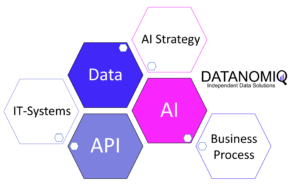Classically, engineers work on data warehousing for business intelligence or process mining and on data lakes for data science, for which more and more datasets are needed. A data warehouse is the underwater, much larger part of the business intelligence (BI) iceberg that feeds reports with qualified data. But data engineering is not just about enterprise-internal data but also about data gathering from external sources and about how to keep the data safe for the organization.
See this as an update to the article: What skills a Data Engineer really needs.
Why Data Engineers need Hacker Qualities
If data is available in a database, analysts with access can already perform simple analyses directly on the database. But how do we get the data into our special analysis tools? Here, the engineer must be able to perform his service and export the data from the database. With direct data connections, APIs, i.e. interfaces such as REST, ODBC or JDBC come into play and a good data engineer needs programming skills, preferably in Python, to be able to address these APIs. Some knowledge of socket connections and client-server architectures sometimes pays off. Furthermore, every data engineer should be familiar with synchronous and asynchronous encryption methods, because confidential data is usually handled. A minimum standard of security is part of data engineering and must by no means be left to data security experts alone. An affinity for network security or even penetration testing should be viewed positively, but at the very least, clean authorization management is one of the basic skills. A lot of data is not available in a structured form in a database, but is so-called unstructured or semi-structured data from documents or from Internet sources. With methods such as data web scraping and data crawling as well as the automation of data retrieval, outstanding data engineers even demonstrate real hacker qualities.
Conductor of data: Orchestrating data flows
One of the core tasks of the data engineer is the development of ETL routes to extract data from sources, transform it into the desired target format and finally load it into the target database. This may sound simple at first, but it becomes a real challenge when many ETL processes combine to form entire ETL chains and networks, which have to run with high performance despite highly frequent data queries. The orchestration of data flows can usually be divided into several stages, from the source into the data warehouse, between the levels in the data warehouse as well as from the data warehouse into further systems, up to the return flow of processed data into the data warehouse (reverse ETL).
Data Security is Key
Data Security is an important consideration for data engineers because it helps to protect sensitive and valuable data from unauthorized access, use, disclosure, disruption, modification, or destruction. Data engineers can ensure data security by implementing proper access controls, encrypting data, implementing backup and disaster recovery systems, and using secure infrastructure. Ensuring data security is important because it helps to protect valuable data and ensure that it is used responsibly.
Hard on the edge of DevOp: automation in cloud architectures
In recent years, the demands on data engineers have increased significantly, because in addition to the actual management of data sets and data streams for analysis purposes, a data engineer is increasingly expected to also manage resources in the cloud, but at least the databases and ETL resources. Beyond that, however, it is increasingly required to understand IT networks and to automate the entire interaction of resources, also as infrastructure as code. The automated deployment of data architectures via CI/CD pipelines is also increasingly turning a data engineer into a DevOp.
 DATANOMIQ is the independent consulting and service partner for business intelligence, process mining and data science. We are opening up the diverse possibilities offered by big data and artificial intelligence in all areas of the value chain. We rely on the best minds and the most comprehensive method and technology portfolio for the use of data for business optimization.
DATANOMIQ is the independent consulting and service partner for business intelligence, process mining and data science. We are opening up the diverse possibilities offered by big data and artificial intelligence in all areas of the value chain. We rely on the best minds and the most comprehensive method and technology portfolio for the use of data for business optimization.




